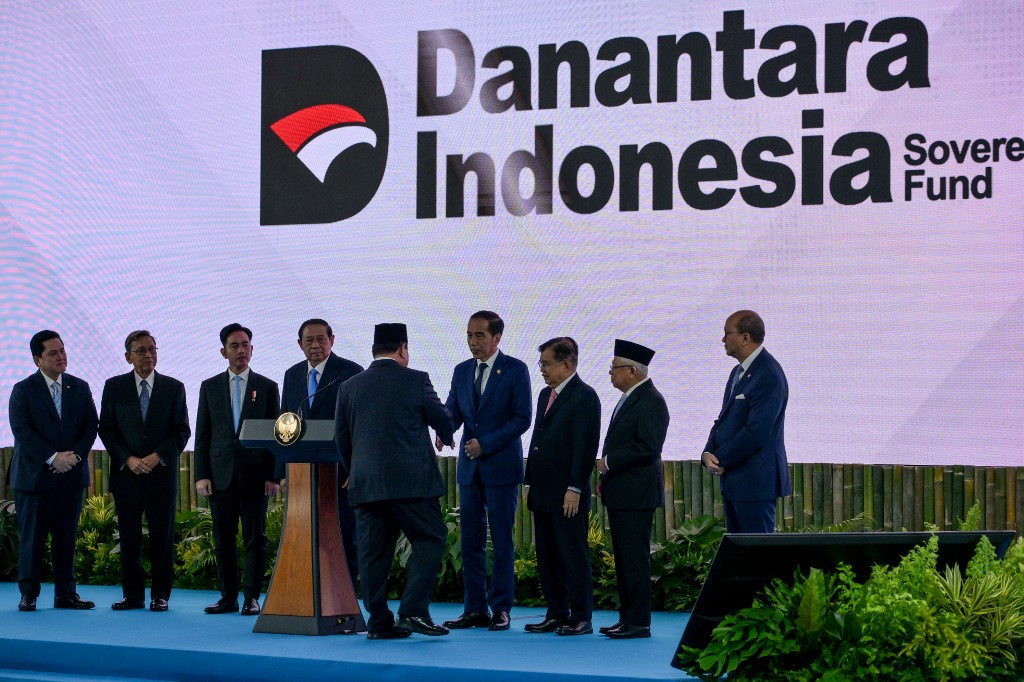Popular Reads
Top Results
Can't find what you're looking for?
View all search resultsPopular Reads
Top Results
Can't find what you're looking for?
View all search resultsFavoritism for Danantara
Relying more on SOEs has proved to be problematic because of rampant corruption and scandals.
Change text size
Gift Premium Articles
to Anyone
W
e have heard President Prabowo Subianto vow to usher in a new era in which private entities would play a greater role in Indonesia’s development as well as an "Indonesia Incorporated" concept.
Yet, the launch of Danantara, Indonesia’s new sovereign wealth fund, could be an early sign of the President’s massive increase in reliance on state-owned enterprises (SOEs) to realize his economic goals, which many feared ahead of his presidency.
The official document of the wealth fund even emphasized the role of SOEs as the backbone of national development, and such things were reflected in the way Danantara was structured.
It began with the administration diverting resources to pool in the fund, including a US$20 billion initial injection and roughly the same amount expected in the coming years.
The fund will consolidate seven major SOEs in the energy, mining, telecom and banking sectors, but it is expected that other SOEs will join the fund by the end of March, cementing its position to manage over $900 billion in total assets.
The fund is also set to focus on wide-ranging strategic sectors, from the downstream nickel, bauxite and copper industries to artificial intelligence data centers, oil refineries, petrochemicals, food production, aquaculture and renewable energy. All of these could also be done through private entities, especially given the supporting environment and incentives.
Prabowo and his close aides may have emphasized on many occasions that the state’s role should be complementary, rather than competitive. Yet, as details of Danantara’s mandate and operations emerge, it appears that the fund is poised to play a far more dominant role than initially suggested.
By wielding substantial financial resources and political backing, the fund could dominate key sectors, leaving little room for private enterprises to compete.
Experts have warned that there is a risk that the government could end up paving the way for Danantara's investments by designing regulations that favor the fund while sidelining private players.
While such things could be justified within legal corridors, we could not rule out that this could undermine a level playing field and could dampen investment appetite.
Undoubtedly, having state-run entities at the government's disposal seems to make things easier and more predictable, since private entities may be more cautious in their actions. However, Prabowo should know that delays, cost overruns and uncertainties will always be an integral part of any project and relying on SOEs will not remove those risks.
The ability of the government to pool a huge sum of money does not ensure smooth implementation. Relying more on SOEs has proved to be problematic because of rampant corruption and scandals shrouding many of them. The most recent example is the alleged corruption in the procurement of crude oil and fuel products involving state energy firm PT Pertamina’s subsidiary, which reportedly caused Rp 193.7 trillion ($11.9 billion) in state losses.
In the case of renewable energy, SOEs have had more than enough time to push adoption in the country’s electricity, but progress has been slow.
The government needs to be wary of its newest wealth fund as the key to Danantara’s success lies in striking the right balance between state intervention and private sector empowerment. Rather than displacing private enterprises, the fund should aim to catalyze private investment.
By creating an enabling environment for businesses to thrive, Danantara can amplify its impact and ensure that its benefits can be felt across different stakeholders.
After Danantara, the government should not forget its unfinished business to improve the country's bureaucracy and governance, which are related to the investment climate and the competitiveness of doing business.











